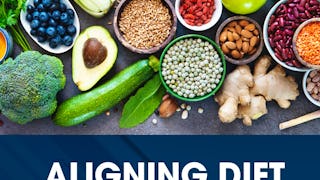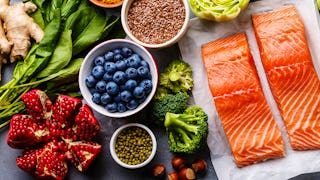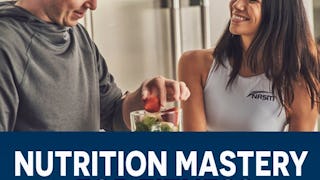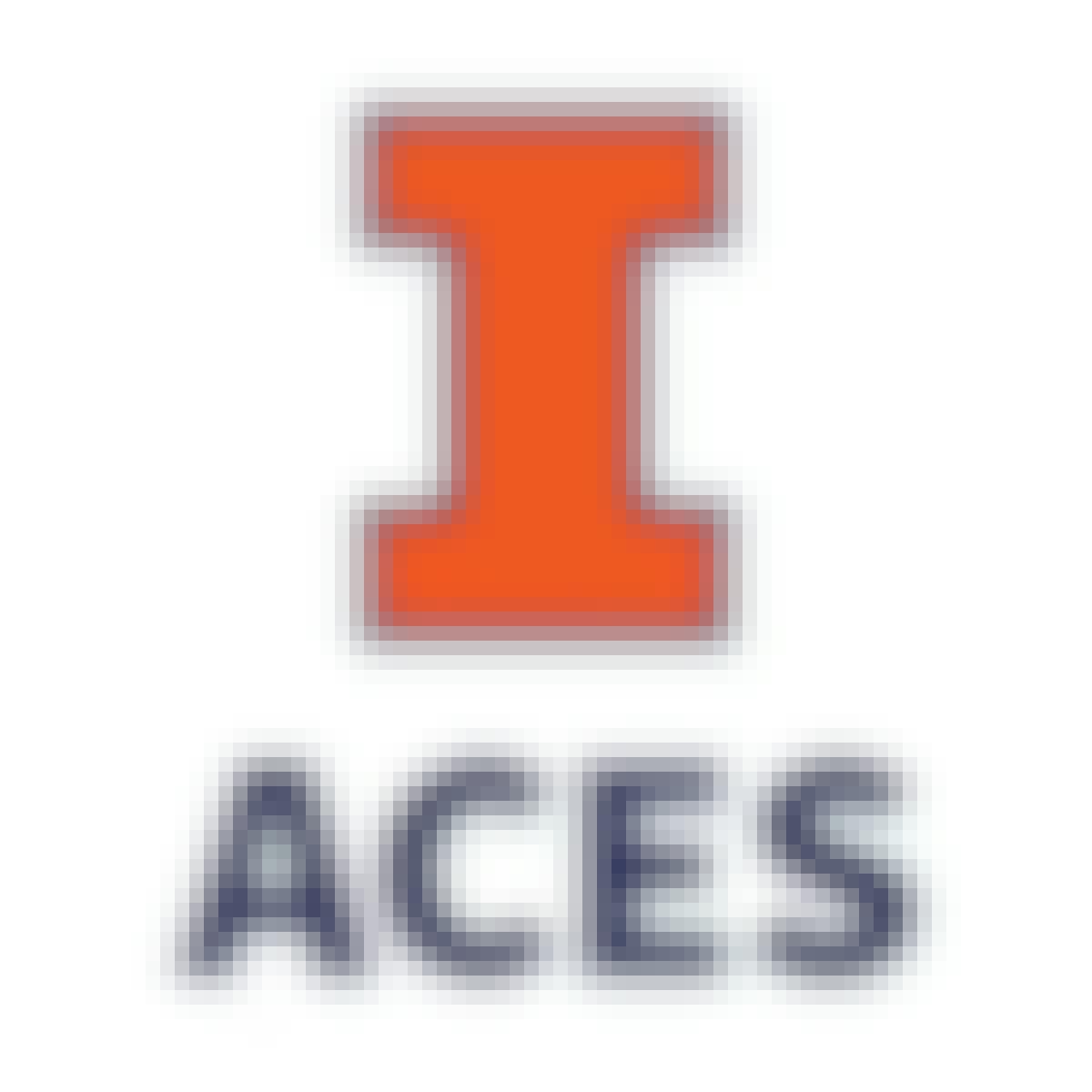- Browse
- Diet
Diet Courses
Diet courses can help you learn nutritional science, meal planning, dietary guidelines, and the impact of food on health. You can build skills in analyzing food labels, understanding macronutrients and micronutrients, and creating balanced meal plans tailored to individual needs. Many courses introduce tools like dietary tracking apps, food databases, and meal prep techniques to help you apply what you learn in everyday life.
Popular Diet Courses and Certifications
 Status: Free TrialFree TrialN
Status: Free TrialFree TrialNNational Academy of Sports Medicine
Skills you'll gain: Exercise Science, Nutrition and Diet, Nutritional Assessment, Sports Medicine, Nutrition Education, Physiology, Kinesiology, Endocrinology, Health And Wellness Coaching, Vital Signs, Stress Management, Biochemistry, Systems Of Measurement, Biology
4.6·Rating, 4.6 out of 5 stars272 reviewsIntermediate · Specialization · 1 - 4 Weeks
 Status: FreeFreeT
Status: FreeFreeTTufts University
Skills you'll gain: Nutrition and Diet, Nutrition Education, Nutritional Assessment, Meal Planning And Preparation, Health Education
4.8·Rating, 4.8 out of 5 stars180 reviewsBeginner · Course · 1 - 4 Weeks
 Status: Free TrialFree TrialN
Status: Free TrialFree TrialNNational Academy of Sports Medicine
Skills you'll gain: Exercise Science, Nutrition and Diet, Sports Medicine, Nutrition Education, Kinesiology, Health And Wellness Coaching
4.8·Rating, 4.8 out of 5 stars104 reviewsIntermediate · Course · 1 - 4 Weeks
 Status: PreviewPreviewE
Status: PreviewPreviewEEmory University
Skills you'll gain: Nutrition and Diet, Physiology, Stress Management, Health And Wellness Coaching, Behavioral Health, Biology, Mindfulness, Resilience, Exercise Science
4.7·Rating, 4.7 out of 5 stars1.2K reviewsBeginner · Course · 1 - 3 Months
 Status: PreviewPreviewS
Status: PreviewPreviewSStanford University
Skills you'll gain: Cooking, Meal Planning And Preparation, Health Promotion, Health Education, Nutrition and Diet, Public Health, Behavior Management, Cultural Diversity, Health Informatics, Chronic Diseases
4.7·Rating, 4.7 out of 5 stars34K reviewsBeginner · Course · 1 - 3 Months
 Status: Free TrialFree TrialN
Status: Free TrialFree TrialNNational Academy of Sports Medicine
Skills you'll gain: Nutritional Assessment, Meal Planning And Preparation, Nutrition and Diet, Nutrition Education, Pharmacology, Exercise Science, Critical Thinking, Sports Medicine, Drug Interaction, Food Quality Assurance And Control, Physiology, Decision Making, Health Promotion, Health And Wellness Coaching, Regulatory Compliance, General Science and Research, Overcoming Obstacles
4.8·Rating, 4.8 out of 5 stars31 reviewsIntermediate · Specialization · 1 - 4 Weeks
What brings you to Coursera today?
 Status: Free TrialFree TrialN
Status: Free TrialFree TrialNNational Academy of Sports Medicine
Skills you'll gain: Stress Management, Medical Nutrition Therapy, Behavioral Health, Psychiatry, Psychosocial Assessments, Mental Health, Exercise Science, Social Determinants Of Health, Nutritional Assessment, Social Sciences, Nutrition and Diet, Cognitive Behavioral Therapy, Health And Wellness Coaching, Kinesiology, Medical Devices, Nutrition Counseling, Sociology, Coaching, Clinical Nutrition, Health Assessment
4.6·Rating, 4.6 out of 5 stars22 reviewsIntermediate · Specialization · 1 - 3 Months
 Status: Free TrialFree TrialN
Status: Free TrialFree TrialNNational Academy of Sports Medicine
Skills you'll gain: Nutrition and Diet, Nutrition Education, Nutritional Assessment, Sports Medicine, Exercise Science, Scientific Methods, Health Assessment, Patient Education And Counseling, Clinical Nutrition, Health And Wellness Coaching, Health Promotion, Athletic Training, Regulatory Compliance, Preventative Care, Food Quality Assurance And Control, Psychology, Medical Science and Research, Life Sciences
4.6·Rating, 4.6 out of 5 stars195 reviewsBeginner · Specialization · 1 - 3 Months
 Status: NewNewStatus: Free TrialFree TrialR
Status: NewNewStatus: Free TrialFree TrialRReal Madrid Graduate School Universidad Europea
Skills you'll gain: Leadership, Collaboration, Physical Stamina, Performance Analysis, Sports Medicine, Nutrition and Diet, Athletic Training, Exercise Science, Injury Prevention, Coaching, Nutrition Education, Innovation, Automation, AI Personalization, Teamwork, Performance Reporting, Technology Solutions, Data Management, Health Technology, Communication
Beginner · Specialization · 3 - 6 Months
 Status: NewNewStatus: Free TrialFree TrialA
Status: NewNewStatus: Free TrialFree TrialAAmerican Council on Exercise
Skills you'll gain: Mindfulness, Nutrition and Diet, Stress Management, Nutrition Education, Health And Wellness Coaching, Preventative Care, Substance Abuse, Chronic Diseases, Health Promotion, Mental Health
Beginner · Course · 1 - 3 Months
 Status: Free TrialFree TrialU
Status: Free TrialFree TrialUUniversity of Michigan
Skills you'll gain: Sustainable Development, Sustainable Design, Nutritional Assessment, Sustainable Business, Nutrition and Diet, Product Lifecycle Management, Product Development, Social Determinants Of Health, Sustainability Standards, Environmental Issue, Product Improvement, Health Policy, Environment, Environmental Science, Health Assessment, Public Health, Climate Change Mitigation, Chemistry, Risk Analysis, Sustainable Engineering
4.4·Rating, 4.4 out of 5 stars114 reviewsIntermediate · Specialization · 3 - 6 Months
 Status: NewNewStatus: Free TrialFree TrialU
Status: NewNewStatus: Free TrialFree TrialUUniversity of Illinois Urbana-Champaign
Skills you'll gain: Health Equity, Health Disparities, Social Determinants Of Health, Nutrition and Diet, Good Manufacturing Practices, Food Quality Assurance And Control, Nutrition Education, AI Personalization, Food Safety and Sanitation, Policy Development, Clinical Nutrition, Regulatory Affairs, Public Health, Regulatory Compliance, Health Policy, Health Informatics, Advocacy, Health Assessment, Health Technology, Microbiology
4.5·Rating, 4.5 out of 5 stars49 reviewsIntermediate · Specialization · 3 - 6 Months
In summary, here are 10 of our most popular diet courses
- Science of Diet and Exercise: National Academy of Sports Medicine
- Building a Healthy Plate: Tufts University
- Aligning Diet and Exercise: National Academy of Sports Medicine
- Weight Management: Beyond Balancing Calories: Emory University
- Stanford Introduction to Food and Health: Stanford University
- Nutrition Mastery for Fitness and Wellness: National Academy of Sports Medicine
- Holistic Weight Management: National Academy of Sports Medicine
- Nutrition Education for the Consumer: National Academy of Sports Medicine
- Sports Nutrition and Training: Innovation Assets: Real Madrid Graduate School Universidad Europea
- Lifestyle & Wellness Strategies: American Council on Exercise
Frequently Asked Questions about Diet
Diet refers to the types of food and drink that a person regularly consumes. It plays a crucial role in overall health and well-being, influencing everything from physical fitness to mental health. A balanced diet can help prevent chronic diseases, support immune function, and enhance energy levels. Understanding the principles of diet is essential for making informed choices that align with personal health goals.
Careers in diet can be diverse and rewarding. Potential job roles include nutritionist, dietitian, food service manager, health coach, and wellness consultant. These positions often involve working with individuals or groups to promote healthy eating habits, develop meal plans, and provide education on nutrition. The growing awareness of health and wellness has led to an increased demand for professionals in this field.
There are several excellent online diet courses available. For instance, the Science of Diet and Exercise Specialization offers a comprehensive understanding of how diet and exercise interact. Another option is the Aligning Diet and Exercise course, which focuses on integrating dietary choices with physical activity for optimal health.
Yes. You can start learning diet on Coursera for free in two ways:
- Preview the first module of many diet courses at no cost. This includes video lessons, readings, graded assignments, and Coursera Coach (where available).
- Start a 7-day free trial for Specializations or Coursera Plus. This gives you full access to all course content across eligible programs within the timeframe of your trial.
If you want to keep learning, earn a certificate in diet, or unlock full course access after the preview or trial, you can upgrade or apply for financial aid.
Diet courses typically cover a range of topics, including nutritional science, meal planning, dietary guidelines, and the impact of food on health. You may also explore specific diets, such as plant-based or Mediterranean diets, and learn about food safety and preparation techniques. Understanding the psychological aspects of eating and behavior change strategies is often included as well.
For training and upskilling employees in the diet field, courses like the New Nordic Diet - from Gastronomy to Health can be particularly beneficial. These programs provide insights into modern dietary practices and their health implications, equipping employees with the knowledge to promote healthier choices within their organizations.










